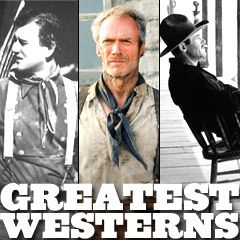
|
Greatest Westerns 1980s-1990s |
| Film Title/Year/Director/Length/Studio, Setting (or Time Period) and Brief Description | |
Heaven's Gate (1980)
Pretentious auteur director, the Oscar-winning Michael Cimino (for the multiple-award-winning The Deer Hunter (1978)), brought out this multi-million dollar failure for United Artists - a detailed, over-long epic western which contributed to the genre's weakening. The overindulgent director had been given unprecedented creative control and a large budget for the production of his long-brewing, flawed script titled The Johnson County War. The expensive 'boondoggle' film and revisionistic Western told about the Johnson County War between starving Eastern European immigrant farmers and mercenaries hired by the cattlemen. It featured a cast of prominent actors (Christopher Walken as hired mercenary Nathan D. Champion, John Hurt in a minor role as Billy Irvine, Kris Kristofferson as US Federal Marshal James Averill, and French actress Isabelle Huppert as young brothel madam Ella Watson). The ponderous and flawed film (with beautiful cinematography and art direction, but often muffled dialogue) included abundant nudity, violence throughout, a love triangle (between Averill, Champion, and Ella), a cock fight, a country-western roller-skating sequence, and a lengthy series of bloody battles and deaths at film's end. Mercenary Nathan Champion suffered a fiery death outside his wall-papered frontier cabin by the hired killers of evil, black-garbed cattlemen association leader Frank Canton (Sam Waterston) - with his hasty writing of a farewell note to his friends knowing that he would die. The film also concluded with the surprising shock ambush killings of both local entrepreneur John L. Bridges (Jeff Bridges) and young bordello madam Ella wearing a beautiful white dress (she died in Sheriff Averill's arms). |

|
Pale Rider (1985)
Producer/director/star Eastwood's quasi-religious (good vs. evil) western film was reminiscent of Shane (1953). And his ghostly, other-worldly "Preacher" (pale rider) character resembled similar ones in his 'spaghetti westerns' ("The Man With No Name") and High Plains Drifter (1973). [Note: This would be Eastwood's last western until Unforgiven (1992).] The film opened with the attempted takeover of the small gold-mining town of Lahood, California by ruthless strip-mining company owner Coy LaHood (Richard Dysart) with his son Josh LaHood (Christopher Penn) and other hired guns. The prayers of young 15 year-old Megan (Sydney Penny) (the daughter of Sarah Wheeler (Carrie Snodgrass)) for a miraculous savior to help defend the town's victimized miners and take a stand came in the form of a 'Pale Rider' - a gunslinging Preacher (Eastwood) riding into town on a pale-colored white horse. The mysterious drifter joined up with unofficial miner leader Hull Barret (Michael Moriarty), Sarah's panhandling fiancee, to organize opposition among the innocent prospectors and to counteract LaHood's brutalities, persecution and bribery. Rather than accept an offer of $1,000 per claim, the miners decided to resist. LaHood's mining facility was blown up with dynamite, and the Preacher executed corrupt county Marshal Stockburn (John Marshall), hired to clear out the town. The film concluded with a Shane-like ending after the town's salvation: the Preacher rode away into the nearby Sierra Madre Mountains as Megan cried out after him. |
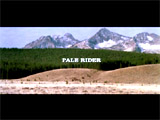
|
Silverado (1985)
The revisionistic western with an ensemble cast was a cliched and rousing tribute to the big-budget, large-casted westerns of the 1950s and 1960s, although it fared poorly at the box-office. Chance encounters brought together four disparate and unlikely heroes in the town of Silverado:
Meanwhile, greedy cattle rancher Ethan McKendrick (Ray Baker) was driving off homesteaders with a murderous posse to maintain an open range for his herds. One of McKendrick's victims was Mal's father Ezra (Joe Seneca). The four misfit cowboys prepared to restore order in Silverado by confronting corrupt and malevolent Sheriff Cobb (Brian Dennehy) who was in cahoots with McKendrick, and running the local saloon with Stella (Linda Hunt). The overly long western concluded with a climactic showdown between the heroes and the villains: a shoot-out and gunfight sequence, before the four parted ways. |
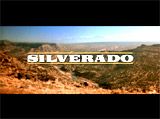
|
Dances with Wolves (1990)
The revisionistic western received twelve nominations and seven Oscar awards including Best Picture and Best Director. It was noted as one of the few westerns that cast Indians in acting roles, used Lakota Sioux sub-titles, and viewed Native Americans in a sympathetic way and not as blood-thirsty savages. Although the film was officially sanctioned by the Sioux, not all Native American groups were sympathetic to its portrayals. One of the film's best set-pieces was the buffalo stampede-hunt. The film's plot followed the adventurous life of a disillusioned Civil War hero - Union Army First Lieutenant John J. Dunbar (Costner), who after the war moved westward to the deserted frontier post of Fort Sedgwick in Dakota Territory. He became acquainted with the local Sioux Indians through widowed Stands With a Fist (Mary McDonnell), a white orphan raised by the tribe's medicine man Kicking Bird (Graham Greene). He also cavorted with a wolf named "Two Socks" for its white forepaws - the derivation of the film's title and his given Sioux name. He found himself living between two worlds when he went native. After helping the Sioux tribe repel warring Pawnee, he married Stands With a Fist. Due to a misunderstanding, however, he was charged with treason and was being taken East for trial when the Sioux freed him. To avoid having the Indians blamed for his circumstances, he retreated with Stands with a Fist leave on horseback. In the film's epilogue, it stated that thirteen years later, the last freed band of Sioux submitted to the US Army at Fort Robinson in Nebraska. |
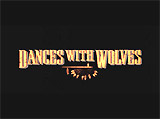
|
Unforgiven (1992)
In this modern-day classic western shot on location, Eastwood reprised his film origins - as a gritty and weathered Western character (e.g., The Man With No Name) and as his urbanized 'Dirty Harry' vigilante in Don Siegel's films. Eastwood played the role of William Munny, a weakened, once-violent, mythological, retired but reformed gunfighter - he was also an aging and struggling Kansas pig farmer, father, and widower (when his wife Claudia died of smallpox in 1878) who had given up drinking. However, the opening title card described his past reputation as a mean-spirited killer: "A known thief and murderer, a man of notoriously vicious and intemperate disposition." Munny reluctantly decided to take on one last bounty-hunting job when he teamed up with his old partner Ned Logan (Morgan Freeman) (whose common-law wife Sally Two Trees (Cherrilene Cardinal) objected to Ned's association with Munny) and a young, cocky, bounty-hunting braggart named the "Schofield Kid" (Jaimz Woolvett), to travel to Big Whiskey, WY to track down two cowboys (who had viciously attacked and slashed the face of prostitute Delilah (Anna Thomson)) and collect the $1,000 bounty reward. Munny claimed to Ned that he had truly reformed himself: "I'm just a fella now. I ain't no different than anyone else no more." In the early 1880s, the town of Big Whiskey, WY was run by mean, corrupt, sadistic, and autocratic Sheriff "Little Bill" Daggett (Gene Hackman, winner of Best Supporting Actor). With his two buddies, Munny arrived there to acquire the bounty on the two cowboys, and then to seek bloody revenge against the corrupt Sheriff for the gruesome death of his friend Ned who had been tortured and murdered who was returning home after the first cowboy was tracked and killed.. With Munny's famous line to the Schofield Kid, after the young braggart admitted that his murder of the second cowboy was actually his first kill: "It's a hell of a thing, killin' a man...You take away all he's got and all he's ever gonna have." |
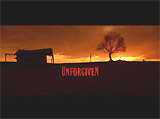
|
Tombstone (1993)
This action-oriented, over two-hours long, violent western about the taming of the West was a tense dramatization of the real-life events of the Gunfight at the O.K. Corral and the Earp Vendetta, seen earlier in John Ford's My Darling Clementine (1946) and Gunfight at the OK Corral (1957). Some of the tale was based on legend rather than historical fact. It told the story of the law-abiding Earp brothers in the town of Tombstone, Arizona: retired Dodge City marshal Wyatt Earp (Kurt Russell), older brother Virgil (Sam Elliott) and younger Morgan (Bill Paxton). In town, Wyatt was reunited with his sickly TB afflicted friend, Southern gambler and gunslinger Doc Holliday (Val Kilmer). Because of problems with his laudanum-addicted common-law wife Mattie Blaylock (Dana Wheeler-Nicholson), Wyatt began an extra-marital romance with saucy traveling theatre actress Josephine "Josie" Marcus (Dana Delany). The town was terrorized and threatened by a lawless, brutal group known as the Cowboys, red sash-wearing, roughnecks led by "Curly Bill" Brocious (Powers Boothe). When the town's Marshal Fred White (Harry Carey, Jr.) was shot dead by Bill, Wyatt stepped in temporarily to prevent an angry mob from lynching him. Virgil Earp became the new town marshal, with both of his brothers Morgan and Wyatt as deputies. Virgil instituted a weapons ban which caused resultant conflict and enmity between the Earps and the Cowboys - and their allied Clanton clan (led by Ike Clanton (Stephen Lang)). These events brought about the legendary Gunfight at the O.K. Corral in 1881. Virgil and Morgan were both wounded, and Billy Clanton (Thomas Haden Church) and other Cowboys were killed. Shortly later, vengeful retaliation brought about the murder of Morgan and the serious wounding of Virgil. After the Earps had left town, Wyatt returned for a vengeful vendetta as U.S. marshal against the leader of the Cowboys: first "Curly Bill" and then sharpshooter Johnny Ringo (Michael Biehn), Curly's successor. During a final duel showdown, Doc killed Ringo and the Cowboys were finally defeated. In the film's conclusion, Doc died in a sanitarium after bidding farewell to Wyatt. And Wyatt humbly proposed marriage to Josie. |

|
Maverick (1994)
Resembling a widescreen TV movie, the genesis of this cliche-ridden, entertaining, stereotypical western-comedy (scripted by William Goldman who was responsible for Butch Cassidy and the Sundance Kid (1969)) was the 1957-1962 ABC-TV series Maverick, starring James Garner (who took another role in the film) as the title character Bret Maverick. Similarly, the film's lead was Bret Maverick (Mel Gibson), a fast-talking, charming card-sharp, who joined up with two other similar types: flirtatious Southern-accented con artist and pickpocket Annabelle Bransford (Jodie Foster), and retired chivalrous lawman and gambler Zane Cooper (James Garner). Maverick's efforts were to raise thousands more dollars in order to afford the $25,000 entry fee for a poker tourney, where all three would soon be participating and competing with each other. The film's climactic showdown was set on a St. Louis riverboat, where Maverick and his two compatriots were playing in a $500,000 dollar, all-night, winner-take-all, five-card-draw poker tournament organized by Commodore Duvall (James Coburn), the owner of the paddle steamer Lauren Belle. In the plot-twisting ending, it was revealed that Maverick and Cooper had conspired together as father and son to win the prize. (Later, Maverick admitted that getting the ace of spades in order to win the championship was simply "magic.") Knowing that they were related from behavioral clues, Annabelle then stole half of their prize money hidden in a satchel (the other half was hidden in his boot), while Maverick admitted to Cooper in one of the final lines: "It's gonna be a whole lot of fun gettin' it back." |
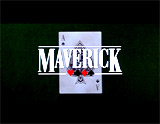
|
Wyatt Earp (1994)
Director Kasdan's muddled version of the oft-envisioned story was a semi-biographical, episodic tale of the whole life span of the famed Western lawman-gunfighter, Wyatt Earp. The rambling and slow-told film (of over 3 hours) first followed the Earp Family in Missouri, composed of strict father Nicholas Porter Earp (Gene Hackman), and the many Earp brothers, two of whom were Union army soldiers: Virgil (Michael Madsen) and James (David Andrews). The teenaged years of Wyatt (Ian Bohen as youth, Kevin Costner as adult) were surveyed, after which Wyatt worked out west as a stagecoach-wagon driver, and a Missouri city policeman. He married childhood sweetheart, Urilla Sutherland (Annabeth Gish) but she soon died tragically of typhoid fever in Missouri. He spent some restless years, depressed, drinking, horse-thieving in Arkansas, and eventually became a buffalo hunter. In Wichita, Kansas, Wyatt Earp began his career as a city lawman in the mid 1870s - and then moved to Dodge City as a marshal to clean up the town, with brothers Bat (Tom Sizemore) and Ed Masterson (Bill Pullman) as his assistants. After a falling out there, he had a short stint as a railroad employee (capturing outlaws such as Dave Rudabaugh), and became life-long friends with Southern gambler/gunman and dentist John "Doc" Holiday (Dennis Quaid) in Texas. Earp returned to Dodge City to restore law and order when he heard of the death of Bat Masterson. Then, he and the Earp family moved to Tombstone, Arizona in 1879, where the outlaw gang of Cowboys, led by Curly Bill Brocius (Lewis Smith), and the McLaury family threatened the peace. Although in a common-law marriage to prostitute Mattie Blaylock (Mare Winningham), Wyatt began a romantic relationship with traveling actress Josie Marcus (Joanna Going). In Tombstone, Wyatt helped to restore order, and was assisted by his brothers as deputies Morgan (Linden Ashby) and Virgil. The latter became Marshal after Curly Bill murdered the town's Marshal Fred White (Boots Southerland). The Cowboys were allied with the Clanton clan, led by Ike (Jeff Fahey). The Gunfight at the OK Corral in 1881 pitted the Earps (and Doc Holliday) against the Cowboys and the Clantons, and Virgil and Morgan were both wounded. A few months later in a vengeful ambush, Virgil was seriously wounded, and Morgan was assassinated. Wyatt led a vendetta as US Marshal against the Cowboys. In the subsequent years, Wyatt (married to Josie, his third wife) became a miner, a saloon manager, a boxing fight referee, and a horse racer. Eventually, he moved to Alaska and was mining gold at the turn of the century, and then lived to the age of 80 (dying in 1929 in Los Angeles). In the film's epilogue, Doc Holliday succumbed to TB (consumption) in a Colorado hospital. |
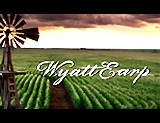
|
(chronological by film title) Introduction | Silents-1930s | 1940s | 1950-1955 | 1956-1959 | 1960-1965 1966-1969 | 1970s | 1980s-1990s | 2000s | 2010s |